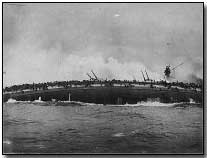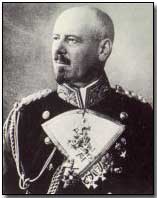Battles - The Battle of Dogger Bank, 1915
 With the German submarine war heavily in
progress and the German home fleet effectively bottled up by
Admiral
Beatty's success at Heligoland Bight, German Admiral
Franz von Hipper decided
to launch a raid upon three British North Sea costal towns by the German Battlecruiser Squadron, comprising five battle cruisers supported by light
cruisers and destroyers. The raid took place on 16 December 1914 at
9am, and resulted in the death of 18 civilians at Scarborough, causing
further damage at Whitby and Hartlepool.
With the German submarine war heavily in
progress and the German home fleet effectively bottled up by
Admiral
Beatty's success at Heligoland Bight, German Admiral
Franz von Hipper decided
to launch a raid upon three British North Sea costal towns by the German Battlecruiser Squadron, comprising five battle cruisers supported by light
cruisers and destroyers. The raid took place on 16 December 1914 at
9am, and resulted in the death of 18 civilians at Scarborough, causing
further damage at Whitby and Hartlepool.
Public and political reaction in Britain expressed outrage that the German Fleet could sail so close to the British coast and proceed to shell coastal towns.
Buoyed by the success of the raid, Admiral Hipper resolved to repeat the endeavour the following month. He was however intercepted by the British on 24 January 1915 at Dogger Bank, midway between Germany and Britain.
Having intercepted German radio traffic - decoded by use of a German code book originally captured by the Russians - the British had learnt of Hipper's proposed sortie on 23 January. Consequently Admiral Beatty set sail with five battle cruisers to meet Hipper's three, aided by a further six light cruisers. Joined by additional cruisers and destroyers at Harwich, Beatty proceeded south before encountering Hipper's outlying vessels at 7.20am on the morning of 24 January.
Realising he was overpowered, Hipper attempted an escape, believing the British battle cruisers to be relatively slow. Beatty's cruisers, however, were notably faster than their German counterparts, and succeeded in reaching their extreme firing range by 9am. Battle was enjoined half an hour later.
 The
British managed to first halt and then sink Blucher (the latter as a
result of a signalling error, killing 782 and captured on moving film) and
damage Hipper's flagship, Seydlitz (killing 192), although the
Germans in turn succeeding in effectively hammering Beatty's own flagship,
Lion, to a standstill. The Lion took no further part in
the battle after 11am.
The
British managed to first halt and then sink Blucher (the latter as a
result of a signalling error, killing 782 and captured on moving film) and
damage Hipper's flagship, Seydlitz (killing 192), although the
Germans in turn succeeding in effectively hammering Beatty's own flagship,
Lion, to a standstill. The Lion took no further part in
the battle after 11am.
Nevertheless, a major British success appeared likely until Beatty, overcome by fears of mines and a believed submarine sighting (there were none), decided to abandon the attack, allowing Hipper's squadron to escape. 15 British sailors had been killed in the encounter.
Although the battle was not itself greatly consequential of itself, it boosted British morale and concerned the German Kaiser, Wilhelm II, enough to issue an order stating that all further risks to surface vessels were to be avoided.
Beatty's second in command, Admiral Moore, was subsequently transferred to the Canary Islands, and the German High Seas Fleet commander, Ingenohl, who was criticised for not coming directly to Hipper's aid, was replaced the following month by Admiral Pohl.
Photographs courtesy of Photos of the Great War website
A "Grand Slam" was British slang for an impending attack or battle.
- Did you know?
